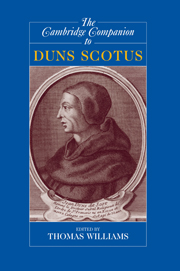Book contents
- Frontmatter
- Introduction
- 1 Scotus on Metaphysics
- 2 Space and Time
- 3 Universals and Individuation
- 4 Duns Scotus’s Modal Theory
- 5 Duns Scotus’s Philosophy of Language
- 6 Duns Scotus on Natural Theology
- 7 Duns Scotus on Natural and Supernatural Knowledge of God
- 8 Philosophy of Mind
- 9 Cognition
- 10 Scotus’s Theory of Natural Law
- 11 From Metaethics to Action Theory
- 12 Rethinking Moral Dispositions
- Bibliography
- Citations of works attributed to John Duns Scotus
- Index
4 - Duns Scotus’s Modal Theory
Published online by Cambridge University Press: 28 May 2006
- Frontmatter
- Introduction
- 1 Scotus on Metaphysics
- 2 Space and Time
- 3 Universals and Individuation
- 4 Duns Scotus’s Modal Theory
- 5 Duns Scotus’s Philosophy of Language
- 6 Duns Scotus on Natural Theology
- 7 Duns Scotus on Natural and Supernatural Knowledge of God
- 8 Philosophy of Mind
- 9 Cognition
- 10 Scotus’s Theory of Natural Law
- 11 From Metaethics to Action Theory
- 12 Rethinking Moral Dispositions
- Bibliography
- Citations of works attributed to John Duns Scotus
- Index
Summary
Recent interest in John Duns Scotus’s modal theory derives largely from the suggestion that Scotus was the first in the Middle Ages, and perhaps the first ever, to employ a synchronic conception of modality, one that allowed for alternative possibilities at a given time, and from the debate about whether Scotus introduced a notion of logical possibility divorced from any question of what powers there are. These issues interact in the question of whether Scotus had any analogue of the notion of possible world in either the Leibnizian or the late twentieth-century sense. Late medieval interest in Scotus’s modal theory derived largely from its role in his account of divine and human freedom and from the debate about whether possibility itself depended in any way upon God. This discussion attempts to shed some light on these issues and to locate them in the context of the issues in the theory of modality with which Scotus and his contemporaries were themselves concerned.
It would be desirable in an essay of this kind to present a picture of the development of Scotus’s thought about modality, but in the current state of scholarship that is not possible. Despite nearly a century of work by the Scotus Commission and by a number of very able scholars outside it, our understanding of the textual tradition of Scotus’s works remains radically incomplete. In such a situation any hypothesis about the development of Scotus’s modal theory must be highly speculative. In what follows I will not attempt to trace such a development but will attempt to limn the modal theory with which Scotus seems to have been working at the end of his (unfortunately short) life.
- Type
- Chapter
- Information
- The Cambridge Companion to Duns Scotus , pp. 129 - 160Publisher: Cambridge University PressPrint publication year: 2002
- 7
- Cited by



